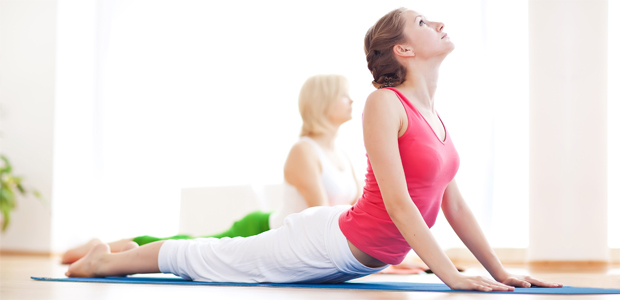Advertisement
8 Common Yoga Types, Decoded
Whether you’re brand new to yoga or you’re a seasoned pro looking to try out a new style, it can be confusing trying to choose a class. Here, we break it down for you by decoding eight common yoga styles. Hatha Hatha is a bit like the Goldilocks of yoga: it’s not too challenging, and … Continued

Whether you’re brand new to yoga or you’re a seasoned pro looking to try out a new style, it can be confusing trying to choose a class. Here, we break it down for you by decoding eight common yoga styles.
Hatha
Hatha is a bit like the Goldilocks of yoga: it’s not too challenging, and it’s not too relaxing. Technically, it’s one of the original branches of yoga, and encompasses many types within it. But basically, a general hatha class is a great place to start if you’re new and trying to decide what you like most in a yoga class. Most yoga studios offer hatha classes, so you’ll likely find one without a problem.
Power
Don’t leap into a power yoga class if you’re new to yoga or if you’re just starting to increase your physical activity level—this can be a very physically demanding class. While not a classic or traditional yoga class, power yoga is loved by many who want a fierce workout. Be prepared to flow quickly from one pose to another, and don’t be surprised if there’s less individual correction.
Hot Yoga
Like power yoga, hot yoga is very physically challenging. As you’d expect, it’s done in a heated room, which means you’ll be working up a sweat! Bikram yoga is one popular version of hot yoga (in which participants do the same 26 poses in a room heated above 100 F) but there are also other hot yoga classes as well.
Flow/Vinyasa
Vinyasa is the Sanskrit word for flow, so vinyasa classes and flow classes are generally used interchangeably. It’s a relatively challenging class where—you guessed it—you flow from one pose to the next with a smooth transition, so you’re typically always moving.
Ashtanga
Modern flow and vinyasa yoga classes are actually derived from the classic style of Ashtanga yoga that was brought to North America in the 1970s. It involves six pose sequences that are performed with smooth transitions quite quickly, in the same order each time. You’ll love it if you enjoy routine and a rigorous, athletic practice (the famous Type A personalities!).
Restorative
Great for soothing injuries, reducing stress, and promoting sleep, a restorative yoga class is shockingly different than the more intensive forms of yoga mentioned above. To make sure you’re in proper alignment, props such as bolsters and blocks are used, and classes are typically scheduled for the evening, when it’s time to relax and unwind.
Yin
Also one of the more relaxing yoga types, yin classes focus on quiet meditation, and poses are held for a long time (five to 20 minutes!). You’ll notice improved flexibility, released tension in the joints, and a calmer mind.
Iyengar
Slightly less common but equally well-loved, Iyengar classes are great detailed-oriented classes for beginners. You’ll learn a solid foundation to take with you to other classes and styles, if you choose. Like restorative yoga, props are often used to ensure proper alignment.
Others
Although we only touched on eight common types of yoga, there are countless yoga styles out there. Feel free to mix things up with laughter yoga, or learn other ways to challenge your current yoga practice.
And remember: if you have an illness or injury, check with your health care practitioner before stepping onto the mat.





